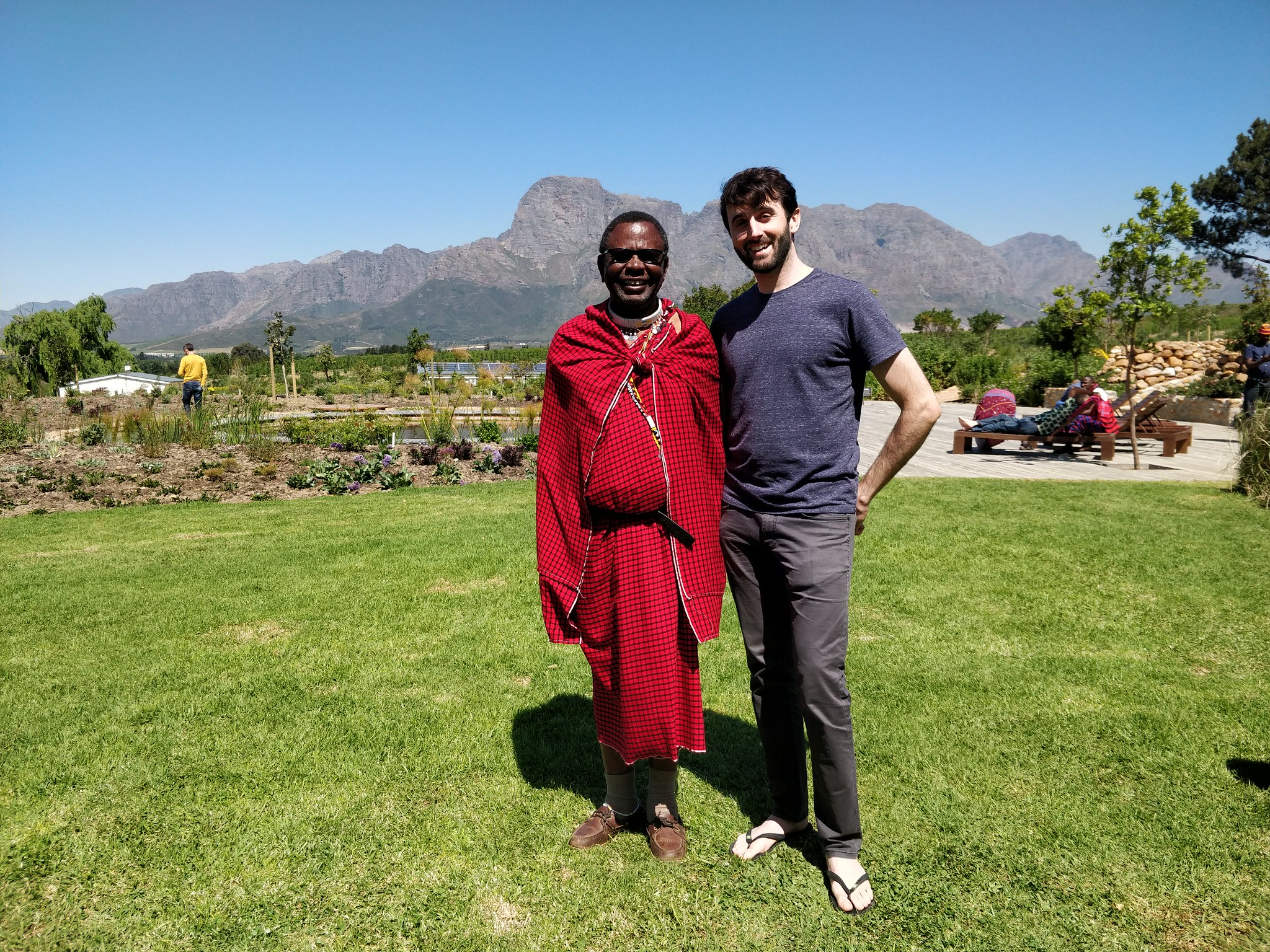The Maasai people of Kenya and Tanzania have a long tradition of living in harmony with nature. However, for the past century they have also seen their land and way of life targetted by encroaching intiatives related to nation-building, development, tourism, mining, etc. As a new decade begins the Maasai are once again being pushed off their lands and told their way of life must end in the name of “progress” or “development”. Today on the podcast, we hear from three members of that community who explain their way of life and the reality they face on the ground today. It’s the story of the Maasai and their struggle to survive.
Tag Archives: sustainability
Moving Closer to Ethical Mobile Phones
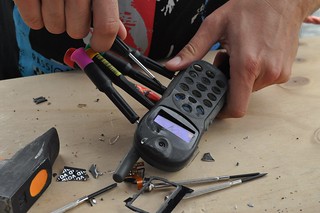
In the summer of 2011 we learned of the fairphone mission; to make the world’s first ethically responsible mobile phone. We spoke about the challenges, the steps, the people and places in the world that would be involved. Now, many months later, we revisit fairphone to get an update and hear about the interesting developments and ongoing initiatives. My guest and guide on this podcast is Bas van Abel of the Waag Society, who has been part of the fairphone initiative since the early days.
We get into:
- Battery
- Miners
- Congo
- Open Design
- Urban Mining
Making Change by Moving Your Money
 Bank Transfer Day was this past weekend. Even now, people around the world are looking at their bank account thinking, maybe I dont want my money with these guys. What are the alternatives? Many will say “all banks are the same” as a way of justifying not doing anything. But what a little investigation can easily reveal is that not all banks are the same.
Bank Transfer Day was this past weekend. Even now, people around the world are looking at their bank account thinking, maybe I dont want my money with these guys. What are the alternatives? Many will say “all banks are the same” as a way of justifying not doing anything. But what a little investigation can easily reveal is that not all banks are the same.
In the US much of the focus is on community banks and credit unions. In Europe, in the Netherlands for example, we have two small banks that are known for their dedication to transparency and sustainability. And now more then ever, as people flock to occupy more spaces to express their disgust and frustration with the global financial system, there is great interest in expressing your dissent by moving money from the big banks to the small sustainable banks.
My guest is James Vacarro, head of Investment Banking for Triodos UK. If you’ve never heard of Triodos or perhaps you’ve only heard a few things about Triodos, give this program a listen. James and I talk about where we stand in this world when it comes to banks, the real impact if moving money, and how the occupy movement is actually very relevant when it comes to pressuring banks and creating initiatives like sustainable banks. For those who have been asking what impact the occupy movement could possibly have on the financial sector- this podcast will give you an answer.
Something more than selling fruit
The navigation system is scolding me with its female voice in Portuguese, I missed yet another turn as I cruise passed yet another apple orchard. It’s the end of September and I’m in what feels like the middle of nowhere Portugal, late for my appointment to visit the Frubaça Fruit Company. As a fruit producer and juice maker their products have caught my attention over the last few years when I am in Portugal. Besides their fruit, their fresh juices have this great combination of simple ingredients (just the fruit) and what seemed to be this ethical business philosophy that I wanted to examine first-hand. So there I am, sort of lost but hoping that just beyond this next beautiful hill I will find what I’m looking for. Suddenly as I’m giving up hope, there it is, with stacks and stacks of fruit crates lining the outside, I’ve arrived at the Coppa (Cooperative that grows the fruit) facility.
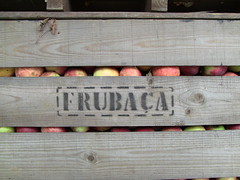 Things are extra busy inside Frubaça, it feels like the high season for apples as they roll passed me on the conveyer belt. At one stage they go under a large machine that shines a light on them, “Infrared Scanning,” Jorge Periquito, president of Frubaça, explains as we walk passed extremely long assembly lines. I can barely hear him over the sound of so many devices and machines as he explains the details of this state-of-the-art infrared scanner that detects any damage or defects to the apples. We go on to see several other fruits being sorted and packaged for sending out to supermarkets and other places throughout the country. Some of the labels are even printed in Spanish and I learn later that beyond Spain the company sends their products to France as well. Hard to believe this modest facility is serving up fruit even beyond the borders of Portugal, but the more I learned about Frubaça, the more I understood, this is no ordinary operation.
Things are extra busy inside Frubaça, it feels like the high season for apples as they roll passed me on the conveyer belt. At one stage they go under a large machine that shines a light on them, “Infrared Scanning,” Jorge Periquito, president of Frubaça, explains as we walk passed extremely long assembly lines. I can barely hear him over the sound of so many devices and machines as he explains the details of this state-of-the-art infrared scanner that detects any damage or defects to the apples. We go on to see several other fruits being sorted and packaged for sending out to supermarkets and other places throughout the country. Some of the labels are even printed in Spanish and I learn later that beyond Spain the company sends their products to France as well. Hard to believe this modest facility is serving up fruit even beyond the borders of Portugal, but the more I learned about Frubaça, the more I understood, this is no ordinary operation.
First there’s the technology: GPS, RFID, Infrared, High Pressure Processing (HPP) Machines, are just some of the tools that play a critical role in how this natural fruit company functions. In the case of the HPP machine, we’re talking about a device with few equals anywhere in the world, a piece of technology based on an old idea (pressure), that isn’t even known by most other companies out there. It simulates the pressure equal to 60 kilometers under the sea, a pressure at which microrganisms are destroyed but the integrity of the juice remains in tact.
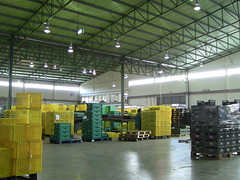 Jorge and I walk up the stairs to the giant metal tube where small bottles of mango juice are being loaded in. This new room we’re in has a fantastic scent of fruit that hits you like the freshest mountain breeze imaginable. As the process begins as we watch the digital display of the pressure meter rise. Nearby another version of the same machine is being loaded up with little packs of apple sauce. Again, all around us, conveyer belts carry bottles of juice to their next destination. Near the juicing machines I’m asked not to take any pictures as the machine manufacturers are very protective of their technology, I leave the camera off and focus my eyes on the apple foam flowing into a nearby drain. I’m temped to cup my two hands together and drink some delicious looking foam.
Jorge and I walk up the stairs to the giant metal tube where small bottles of mango juice are being loaded in. This new room we’re in has a fantastic scent of fruit that hits you like the freshest mountain breeze imaginable. As the process begins as we watch the digital display of the pressure meter rise. Nearby another version of the same machine is being loaded up with little packs of apple sauce. Again, all around us, conveyer belts carry bottles of juice to their next destination. Near the juicing machines I’m asked not to take any pictures as the machine manufacturers are very protective of their technology, I leave the camera off and focus my eyes on the apple foam flowing into a nearby drain. I’m temped to cup my two hands together and drink some delicious looking foam.
During my two hours at the plant Jorge explains the company, cooperative actually, from the beginning. He is one of 5 people that, since 1992, oversee the cooperative, all of which are from this rural community. They invested heavily in technology and go regularly to trade fairs and conferences all over the world, in an effort to know all the latest methods for handling the growing of fruit and production process. They’re not trying to be organic, their intention is to only use pesticides when it is absolutely necessary, a system of evaluation known as “integrated pest management.”
At some point I asked Jorge about business, his approach to the global demand that says – a company must grow and make more profit year after year. His response was that the company is not interested in growth for the sake of growth. They won’t try to fight price wars to sell the cheapest fruit, choosing instead to offer the best quality, in hopes that customers recognize the value. They won’t move or expand, this is their community and their intention is to keep it healthy and working. Then, a conversation topic I never expected to arise – arose: “The socioeconomic model of the urban setting is finished.” Technology from the city applied back in the countryside can help create a healthy and sustainable life in a way that is increasingly hard to achieve in the urban setting.
For a moment I though Jorge must have been listening to my latest podcasts or reading my tweets. But then I realized the connection- sustainable business. Quality food with real ingredients produced by a proud community that has been there for generations. Using the latest in technology and applying it to old fashion ideas. It all connects back to the theme of doing things differently then the conventional way. Taking steps to build lives that are about something other than making money and consuming as much as possible. Once again I had stumbled upon the kind of ideas and practices that have the power to change our world.
New Approaches and Proven Methods for Rural Life
 The goal to live life on their terms took Ryanne and Jay from New York City to San Francisco and eventually to Western Virginia. It is here that this dynamic couple set out to build their own home, grow some of their own food, work on their terms, and generally tinker with life choices that were previously not an option or unaffordable. The result is an inspiring start to healthy, stimulating and more sustainable life at a time where so many feel such goals are unreachable.
The goal to live life on their terms took Ryanne and Jay from New York City to San Francisco and eventually to Western Virginia. It is here that this dynamic couple set out to build their own home, grow some of their own food, work on their terms, and generally tinker with life choices that were previously not an option or unaffordable. The result is an inspiring start to healthy, stimulating and more sustainable life at a time where so many feel such goals are unreachable.
In this program I’m joined by Ryanne and Jay via skype as they explain how they came to this decision and all the aspects of the home and life they have built together in a place you might not have expected to find them.
Their Flickr Photos documenting their projects
Ryan is Hungry, the Vlog
Lost Knowledge Needs Finding
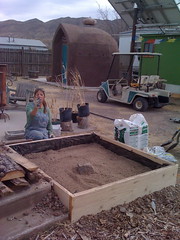
This week Im working on a series of podcasts as well as an article for United Academics Magazine which focuses on people who have created their own home and work spaces. Those who left cities and suburbs, left houses and apartments, left conventional jobs, and moved to a rural or undeveloped place. In their new environments they have built or rebuilt their homes using a mix of traditional, proven techniques and new, innovative features. They do things like grow/raise their own food, collect their own water, generate their own power, and create their own kinds of income-generating work.
This phenomenon, at first glance, is nothing new; people have been leaving cities for the country periodically for decades. (though statistically more people do the opposite) But this generation is the unique above all for the techniques and knowledge it brings to these remote locations. Knowledge that is not only their own, but the never-ending collective knowledge one can consult via the internet. Installing a solar power system? Never built a barn before? Canned your own preserves? Check youtube, the step-by-step instructions are there waiting for you.
Of course the internet is not the only source of knowledge, the offline community that one joins when moving to a rural area also has its own experience and skills which might be called upon. Between the depth of the internet and the generations of experience in your town, whatever it is you don’t yet know how to do on your own, you can learn. And this is exactly what is happening.
Back in the urban-suburban world that so many in the western hemisphere see as the only two choices, such life changes are probably still seen as odd or undesirable. They might lose sleep over barely tenable costs of living and work stress, but they’ve grown up with the idea that this is all normal and simply “life”. Need something for the kids or for the house? Go to Walmart. Need heat? Turn up the thermostat. All needs are met by some external service or source, all of which come at a monetary cost. Again, at some point this may seem like the only way life works. But this group of people has proven otherwise, and their will to take action in this manner has inspired more people to do the same.
In the coming series of podcasts you will hear from this special group of people. They’re explain how they used to live and what led them to make a radical change. They’ll also explain the details about why this way of life not only works better for them, but why they are better prepared for the foreseeable future where the value of money decays further and the ability to grow or make things becomes more rare and necessary.
